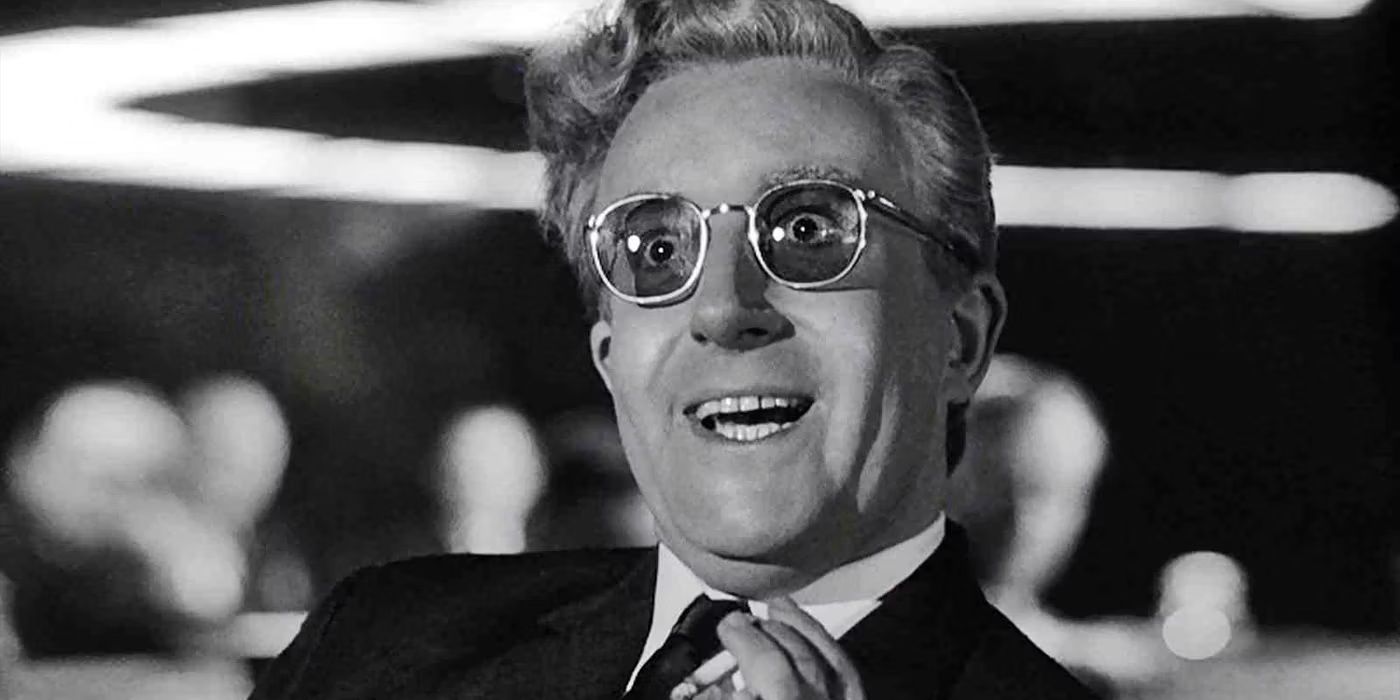The Massive Image
-
Dr. Strangelove
is a black comedy masterpiece by Stanley Kubrick that satirizes the Chilly Conflict tensions of the Sixties, mixing humor and horror. - The movie’s unique pie struggle ending was scrapped in favor of a extra poignant conclusion highlighting the cynicism of the army complicated.
- Kubrick’s route and the performances of Scott and Sellers elevate the movie, showcasing a fragile steadiness of tones and feelings.
Solely Stanley Kubrick may loosely adapt a thriller novel about nuclear struggle, flip it right into a black comedy, have it’s equally hilarious, profound, and prophetic, and in the end quantity to being a traditional. Amid the rampant Chilly Conflict that was dominant within the political local weather in 1964, Dr. Strangelove or: How I Realized to Cease Worrying and Love the Bomb imagines an absurdist, but wholly believable, comedy of errors that may plunge the world into nuclear destruction. The movie is a magic trick completely topped off by an iconic ending that just about did not materialize.
Dr. Strangelove Or: How I Learned To Stop Worrying And Love The Bomb (1964)
Stanley Kubrick’s 1964 black-and-white satire Dr. Strangelove or: How I Realized to Cease Worrying and Love the Bomb parodies the rising tensions between america and the Soviet Union in the course of the Chilly Conflict. Starring Peter Sellers, the plot revolves round a US Air Drive normal who orders a nuclear assault on the Soviet Union towards the desires of the federal government.
- Launch Date
- January 29, 1964
- Director
- Stanley Kubrick
- Runtime
- 95 minutes
- Primary Style
- Comedy
- Writers
- Stanley Kubrick , Terry Southern , Peter George
- Studio
- Columbia Photos
‘Dr. Strangelove’ Builds Towards an Apocalyptically Bleak Ending
After paranoid and war-minded Common Jack D. Ripper (Sterling Hayden) goes rogue and orders a bombing assault on the Soviet Union, Dr. Strangelove facilities on a bunch of politicians and army generals making an attempt to thwart the strike and avert world nuclear struggle altogether. The technique within the Pentagon’s struggle room is spearheaded by Common “Buck” Turgidson (George C. Scott) and President Merkin Muffley (Peter Sellers, who performs two further components, together with the titular position). Whereas sustaining a tone of sincerity to start out, Kubrick unwinds the austerity of the politicians and generals via moments of absurdism and slapstick comedy. The concept that these figures are chargeable for the protection and livelihood of the free world is the relentless sucker punch that Kubrick sends his viewers. A movie as biting and cynical as Dr. Strangelove may solely shut out a method: the revelation that Dr. Strangelove is a Nazi, and a montage of nuclear explosions the world over, accompanied by the juxtaposed mushy tune, “We’ll Meet Once more.”
In a Kubrickian twist, this was not the meant ending upon filming. As an alternative of nuclear weapons, the director initially opted for pastries. Dr. Strangelove initially referred to as for a climactic pie struggle to erupt within the struggle room after the Russian diplomat, Alexi de Sadesky (Peter Bull), throws a custard pie at Turgidson, however inadvertently strikes the President. Inside no time, each politician and normal within the room begins hurling pies at one another in a chaotic ambush that mimicked the feeling of struggle fight. Rare archive photographs of the unique ending are displayed on the British Movie Institute‘s web site. Believed to be destroyed, the footage of the pie struggle climax was once screened in 1999 on the Nationwide Movie Theater in London.
On paper, the intent and narrative throughline of this ending are evident. It confirms that these highly effective figures are buffoons, and contemplating that the movie embraced slapstick and farce all through the runtime, the route to lean into absurdity at full throttle when concluding the story is logical. Earlier within the movie, Turgidson and Sadesky interact in a bodily altercation close by a buffet desk contained in the struggle room, the place President Muffley insists that combating mustn’t ensue, because it was the struggle room. That is the one remnant of the alternate ending left within the remaining minimize. The Strangelove and Ripper characters really feel pulled from a sketch comedy present. The picture of Slim Pickens driving a nuclear missile like a cowboy on a saddle stays prevalent within the tradition. These thrives of broad comedy are the brilliance of Dr. Strangelove, elevated by the truth that it was directed by the identical resolute and calculated visionary behind 2001: A House Odyssey and A Clockwork Orange down the road.
George C. Scott Did not Need To Get Foolish
Regardless of its roots in farcical comedy, a pie struggle being the cherry on prime of a satire on U.S. overseas affairs and the Chilly Conflict pushes the road of farce past its limits. Opposite to widespread perception as a chilly and sterile filmmaker, Kubrick flavors his movies with an array of tones and emotions. He can swiftly shift from black comedy to nightmarish horror in the identical story. Dr. Strangelove is considered one of Kubrick’s most completed bids at juggling dueling tones, seamlessly strolling the advantageous line between a struggle room procedural drama (akin to the opposite 1964 Chilly Conflict movie about an inadvertent nuclear disaster, Fail Secure) and absurdist comedy. Jokes usually are not derived from a routine of setups and punchlines, however relatively affected person building of characters who mirror actuality.
Kubrick’s graciousness with the broad comedy of Dr. Strangelove is manifested in his route of George C. Scott’s efficiency because the blundering head of the Joint Chiefs of Employees. The actor was self-conscious about decreasing himself to play a personality of inherent buffoonery. As a result of this countered his imaginative and prescient, Kubrick requested that Scott give an animated and eccentric take as “practice” earlier than enjoying it sincerely for a respective scene. As the ultimate product entails, these “apply takes” had been the actual takes. That withstanding, Scott’s austere demeanor is resonant on display. Moreover, Sellers’ efficiency because the President and change officer Lionel Mandrake is rooted in deadpan. The versatile actor was expert in extracting the mildest humor in essentially the most unassuming settings. Visually, Dr. Strangelove, as anticipated as a Kubrick movie, is exceptionally crafted and exactly staged, using shadows and fogs to boost the fatalistic stakes on the coronary heart of the story.
Why the Pie Battle Wasn’t Proper for ‘Dr. Strangelove’
The movie’s tightrope stroll of tones and genres would have been shattered by the alternate pie struggle ending. The poignant satire is crucial to the movie’s basis and would have been muddied by this excessive case of farce. It loses sight of the sobering realities that had been on the pulse of society in 1964. The pie struggle is satirical, however not grim. The ending that the general public has skilled is important to conveying Kubrick’s harsh cynicism in direction of the U.S. army complicated and the manipulative concern churned by the federal government over the specter of a Russian nuclear assault. With out the present ending, Dr. Strangelove is merely a curious train, albeit a formidable one, of using black comedy in a setting of despair.
There are two accounts as to why the ending of Dr. Strangelove was altered. Merely put, the conclusion was modified as a result of Stanley Kubrick wasn’t pleased with it. “I made a decision it was farce and never according to the satiric tone of the remainder of the movie,” the director claimed in an interview in 1969. One different rationale for the change entails the assassination of John F. Kennedy, which occurred across the time of the movie’s meant launch date. This precipitated Colombia Photos to move its theatrical release to January 1964 in trepidation that the general public wouldn’t need to see such a cynical movie concerning nationwide turmoil.

‘Dr. Strangelove’ Was Originally a Grim Thriller, Until Kubrick Did the Research
The Stanley Kubrick’s struggle satire was initially written as a severe drama.
Dr. Strangelove‘s editor, Anthony Harvey, recommended on the film’s 40th anniversary DVD release that the unique ending was minimize attributable to an inopportune line of dialogue by Turgidson. After President Muffley is hit with a pie to the face, the Common exclaims “Gents! The president has been struck down, within the prime of his life and his presidency!” In response to Harvey, the pie struggle would have stayed within the remaining minimize if not for this line, as Colombia feared that it will offend the mourning Kennedy household. Nevertheless, different events have claimed that the unique ending had been minimize earlier than Kennedy’s dying occurred.
If the story of the weird alternate ending to Dr. Strangelove proves something, it’s that luck and sharp instincts are paramount within the movie business. The material of movie historical past may have been affected by the shortage of a profound ending. If a juvenile pie struggle closed out the movie, possibly Stanley Kubrick doesn’t start a Golden Age run of contemporary classics. Perhaps the cultural understanding of the complexities of the Chilly Conflict is rarely totally grasped due to this circumstance. Both method, the movie neighborhood appears glad with how the movie performs out.
Dr. Strangelove is offered to lease or purchase on Prime Video within the U.S.




